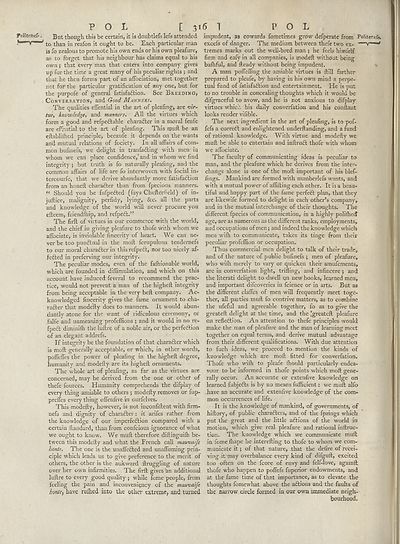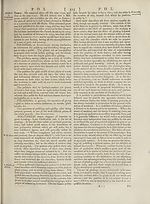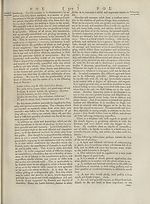Encyclopaedia Britannica > Volume 15, PLA-RAM
(356) Page 316
Download files
Complete book:
Individual page:
Thumbnail gallery: Grid view | List view

POL [31
But though this be certain, it is doubtlefs lefs attended
to than in reafon it ought to be. Each particular man
is fo zealous to promote his own ends or his own pleafure,
as to fbrget that his neighbour has claims equal to his
own; that every man that enters into company gives
up for the time a great many of his peculiar rights ; and
that he then forms part of an affociation, met together
not for the particular gratification of any one, but for
the purpofe of general fatisfadtion. See Breeding,
Conversation, and Good Manners.
The qualities effential in the art of pleafing, are vir¬
tue, knowledge, and manners. All the virtues which
form a good and refpedtabie charadter in a moral fenfe
are efihntial to the art of pleafing. This muft be an
eftablilhed principle, becaufe it depends on the wants
and mutual relations of fociety. In all affairs of com¬
mon bufinefs, we delight in tranfadling with men in
whom we can place confidence,*and in whom we find
integrity ; but truth is fo naturally pleafing, and the
common affairs of life are fo interwoven with focial in-
tercourfe, that we derive abundantly more fatisfadtion
from an honell character than from fpecious manners.
“ Should you be fufpedted (fays Chefterfield) of in-
juftice, malignity, perfidy, lying, &c. all the parts
and knowledge of the world will never procure you
efteem, friendfhip, and refpedt.”
The firft of virtues in our commerce with the world,
and the chief in giving pleafure to thofe with whom we
affociate, is inviolable fincerity of heart. We can ne¬
ver be too punctual in the moft fcrupulous tendernefs
to our moral character in this refpedt, nor too nicely af¬
fected in preferving our integrity.
The peculiar modes, even of the fafhionable world,
which are founded in diffimulation, and which on this
account have induced feveral to recommend the prac¬
tice, would not prevent a man of the highefl integrity
from being acceptable in the very belt company. Ac¬
knowledged fincerity gives the fame ornament to cha¬
racter that modefly does to manners. It would abun¬
dantly atone for the want of ridiculous ceremony, or
falfe and unmeaning profefiions ; and it would in no re-
fpeCt diminifh the luitre of a noble air, or the perfection
of an elegant addrefs.
If integrity be the foundation of that character which
is moft generally acceptable, or which, in other words,
pofteffes the power of pleafing in the higheft degree,
humanity and modefty are its higheft ornaments.
The whole art of pleafing, as far as the virtues are
concerned, may be derived from the one or othef of
thefe fources. Humanity comprehends the difplay of
every thing amiable to others ; modefty removes or fup-
preffes every thing offenfive in ourfelves.
This modefty, however, is not inconfiftent with firm-
nefs and dignity of character: it arifes rather from
the knowledge of our imperfeCtion compared with a
certain ftandard, than from confcious ignorance of what
we ought to know. We muft therefore diftinguifh be¬
tween this modefty and what the French call mauvaife
honte. The one is the unaffeCted and unaftuming prin¬
ciple which leads us to give preference to the merit of
others, the other is the aukward ftruggling of nature
over her own infirmities. The firft gives an additional
luftre to ever}’’ good quality ; while fome people, from
feeling the pain and inconveniency of the mauvaife
honte, have ruftied into the other extreme, and turned
6 1 POL
impudent, as cowards fometimes grow defperate from Politer tfs.
excels of danger. The medium between thefe two ex- "’v
tremes marks out the well-bred man ; he feels himlelf
firm and eafy in all companies, is modeft without being
bafhful, and Heady without being impudent.
A man pofiefling the amiable virtues is ftill farther
prepared to pleafe, by having in his own mind a perpe¬
tual fund of fatisfaCtion and entertainment. He is put
to no trouble in concealing thoughts wdfich it would be
difgraceful to avow, and he is not anxious to difplay
virtues which his daily converfation and his conftant
looks render vifible.
The next ingredient in the art of pleafing, is to pof-
fefs a correft and enlightened underftanding, and a fund
of rational knowledge. With virtue and modefty we
muft be able to entertain and inftruCl thofe with whom
we aftbciate.
The faculty of communicating ideas is peculiar to
man, and the pleafure which he derives from the inter¬
change alone is one of the moft important of his blef-
fings. Mankind are formed with numberlefs wants, and
wdth a mutual powrer of affifting each other. It is a beau¬
tiful and happy part of the fame perfect plan, that they
are likewife formed to delight in each other’s company,
and in the mutual interchange of their thoughts. The
different fpecies of communication, in a highly polifhed
age, are as numerous as the different ranks, employments,
and occupations of men; and indeed the knowledge which
men wilh to communicate, takes its tinge from their
peculiar profeffion or occupation.
Thus commercial men delight to talk of their trade,
and of the nature of public bufinefs ; men of pleafure,
who wiih merely to vary or quicken their amufements,
are in converfation light, trifling, and infincere ; and
the literati delight to dwell on new books, learned men,
and important difcoveries in fcience or in arts. But as
the different claffes of men will frequently meet toge¬
ther, all parties muft fo contrive matters, as to combine
the ufeful and agreeable together, fo as to give the
greateft delight at the time, and the Jgreateft pleafure
on refleftion. An attention to thefe principles would
make the man of pleafure and the man of learning meet
together on equal terms, and derive mutual advantage
from their different qualifications. With due attention
to fuch ideas, we proceed to mention the kinds of
knowledge which are moft fitted for converfation.
Thofe who wifh to pleafe fhould particularly endea¬
vour to be informed in thofe points which moft gene¬
rally occur. An accurate or extenfive knowledge on
learned fubjetfts is by no means fufficient: we muft alfo
have an accurate and extenfive knowledge of the com¬
mon occurrences of life.
It is the knowledge of mankind, of governments, of
hiftory, of public charafters, and of the fprings which
put the great and the little aftions of the world in
motion, which give real pleafure and rational inftruc-
tion. The knowledge which we communicate muft;
in fome fhape be interefting to thofe to whom we com¬
municate it ; of that nature, that the deiire of recei¬
ving it may overbalance every kind of difguft, excited
too often on the fcore of envy and felf-love, againft
thofe who happen to poffefs fuperior endowments, and
at the fame time of that importance, as to elevate the
thoughts fomewhat above the actions and the faults of
the narrow circle formed in our own immediate neigh¬
bourhood.
But though this be certain, it is doubtlefs lefs attended
to than in reafon it ought to be. Each particular man
is fo zealous to promote his own ends or his own pleafure,
as to fbrget that his neighbour has claims equal to his
own; that every man that enters into company gives
up for the time a great many of his peculiar rights ; and
that he then forms part of an affociation, met together
not for the particular gratification of any one, but for
the purpofe of general fatisfadtion. See Breeding,
Conversation, and Good Manners.
The qualities effential in the art of pleafing, are vir¬
tue, knowledge, and manners. All the virtues which
form a good and refpedtabie charadter in a moral fenfe
are efihntial to the art of pleafing. This muft be an
eftablilhed principle, becaufe it depends on the wants
and mutual relations of fociety. In all affairs of com¬
mon bufinefs, we delight in tranfadling with men in
whom we can place confidence,*and in whom we find
integrity ; but truth is fo naturally pleafing, and the
common affairs of life are fo interwoven with focial in-
tercourfe, that we derive abundantly more fatisfadtion
from an honell character than from fpecious manners.
“ Should you be fufpedted (fays Chefterfield) of in-
juftice, malignity, perfidy, lying, &c. all the parts
and knowledge of the world will never procure you
efteem, friendfhip, and refpedt.”
The firft of virtues in our commerce with the world,
and the chief in giving pleafure to thofe with whom we
affociate, is inviolable fincerity of heart. We can ne¬
ver be too punctual in the moft fcrupulous tendernefs
to our moral character in this refpedt, nor too nicely af¬
fected in preferving our integrity.
The peculiar modes, even of the fafhionable world,
which are founded in diffimulation, and which on this
account have induced feveral to recommend the prac¬
tice, would not prevent a man of the highefl integrity
from being acceptable in the very belt company. Ac¬
knowledged fincerity gives the fame ornament to cha¬
racter that modefly does to manners. It would abun¬
dantly atone for the want of ridiculous ceremony, or
falfe and unmeaning profefiions ; and it would in no re-
fpeCt diminifh the luitre of a noble air, or the perfection
of an elegant addrefs.
If integrity be the foundation of that character which
is moft generally acceptable, or which, in other words,
pofteffes the power of pleafing in the higheft degree,
humanity and modefty are its higheft ornaments.
The whole art of pleafing, as far as the virtues are
concerned, may be derived from the one or othef of
thefe fources. Humanity comprehends the difplay of
every thing amiable to others ; modefty removes or fup-
preffes every thing offenfive in ourfelves.
This modefty, however, is not inconfiftent with firm-
nefs and dignity of character: it arifes rather from
the knowledge of our imperfeCtion compared with a
certain ftandard, than from confcious ignorance of what
we ought to know. We muft therefore diftinguifh be¬
tween this modefty and what the French call mauvaife
honte. The one is the unaffeCted and unaftuming prin¬
ciple which leads us to give preference to the merit of
others, the other is the aukward ftruggling of nature
over her own infirmities. The firft gives an additional
luftre to ever}’’ good quality ; while fome people, from
feeling the pain and inconveniency of the mauvaife
honte, have ruftied into the other extreme, and turned
6 1 POL
impudent, as cowards fometimes grow defperate from Politer tfs.
excels of danger. The medium between thefe two ex- "’v
tremes marks out the well-bred man ; he feels himlelf
firm and eafy in all companies, is modeft without being
bafhful, and Heady without being impudent.
A man pofiefling the amiable virtues is ftill farther
prepared to pleafe, by having in his own mind a perpe¬
tual fund of fatisfaCtion and entertainment. He is put
to no trouble in concealing thoughts wdfich it would be
difgraceful to avow, and he is not anxious to difplay
virtues which his daily converfation and his conftant
looks render vifible.
The next ingredient in the art of pleafing, is to pof-
fefs a correft and enlightened underftanding, and a fund
of rational knowledge. With virtue and modefty we
muft be able to entertain and inftruCl thofe with whom
we aftbciate.
The faculty of communicating ideas is peculiar to
man, and the pleafure which he derives from the inter¬
change alone is one of the moft important of his blef-
fings. Mankind are formed with numberlefs wants, and
wdth a mutual powrer of affifting each other. It is a beau¬
tiful and happy part of the fame perfect plan, that they
are likewife formed to delight in each other’s company,
and in the mutual interchange of their thoughts. The
different fpecies of communication, in a highly polifhed
age, are as numerous as the different ranks, employments,
and occupations of men; and indeed the knowledge which
men wilh to communicate, takes its tinge from their
peculiar profeffion or occupation.
Thus commercial men delight to talk of their trade,
and of the nature of public bufinefs ; men of pleafure,
who wiih merely to vary or quicken their amufements,
are in converfation light, trifling, and infincere ; and
the literati delight to dwell on new books, learned men,
and important difcoveries in fcience or in arts. But as
the different claffes of men will frequently meet toge¬
ther, all parties muft fo contrive matters, as to combine
the ufeful and agreeable together, fo as to give the
greateft delight at the time, and the Jgreateft pleafure
on refleftion. An attention to thefe principles would
make the man of pleafure and the man of learning meet
together on equal terms, and derive mutual advantage
from their different qualifications. With due attention
to fuch ideas, we proceed to mention the kinds of
knowledge which are moft fitted for converfation.
Thofe who wifh to pleafe fhould particularly endea¬
vour to be informed in thofe points which moft gene¬
rally occur. An accurate or extenfive knowledge on
learned fubjetfts is by no means fufficient: we muft alfo
have an accurate and extenfive knowledge of the com¬
mon occurrences of life.
It is the knowledge of mankind, of governments, of
hiftory, of public charafters, and of the fprings which
put the great and the little aftions of the world in
motion, which give real pleafure and rational inftruc-
tion. The knowledge which we communicate muft;
in fome fhape be interefting to thofe to whom we com¬
municate it ; of that nature, that the deiire of recei¬
ving it may overbalance every kind of difguft, excited
too often on the fcore of envy and felf-love, againft
thofe who happen to poffefs fuperior endowments, and
at the fame time of that importance, as to elevate the
thoughts fomewhat above the actions and the faults of
the narrow circle formed in our own immediate neigh¬
bourhood.
Set display mode to:
![]() Universal Viewer |
Universal Viewer | ![]() Mirador |
Large image | Transcription
Mirador |
Large image | Transcription
Images and transcriptions on this page, including medium image downloads, may be used under the Creative Commons Attribution 4.0 International Licence unless otherwise stated. ![]()
| Encyclopaedia Britannica > Encyclopaedia Britannica > Volume 15, PLA-RAM > (356) Page 316 |
|---|
| Permanent URL | https://digital.nls.uk/191905404 |
|---|
| Attribution and copyright: |
|
|---|
| Description | Ten editions of 'Encyclopaedia Britannica', issued from 1768-1903, in 231 volumes. Originally issued in 100 weekly parts (3 volumes) between 1768 and 1771 by publishers: Colin Macfarquhar and Andrew Bell (Edinburgh); editor: William Smellie: engraver: Andrew Bell. Expanded editions in the 19th century featured more volumes and contributions from leading experts in their fields. Managed and published in Edinburgh up to the 9th edition (25 volumes, from 1875-1889); the 10th edition (1902-1903) re-issued the 9th edition, with 11 supplementary volumes. |
|---|---|
| Additional NLS resources: |
|

